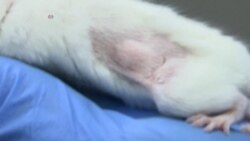Some people are turning to laboratory mice to find out what drugs might work best for their type of cancer. That's what Eileen Youtie of Miami, Florida did.
"I have what's called Triple Negative (breast cancer). I have a genetic mutation called BRCA1, which increases your chance of getting breast cancer by 80 percent," said Youtie.
Youtie paid Champions Oncology, a company based in New Jersey, to try to find a treatment that could work for her. Dr. Angela Davies is the chief medical officer for Champions Oncology.
"What we do is implant patient tumor tissue...into an immunodeficient mouse, or a mouse that doesn't have an intact immune system, so that we can grow that tumor and then test different drug therapies to be able to predict which drugs are going to work best in a patient," said Davies.
The laboratory can try out different drugs on a number of mice at the same time. Youtie had several treatments to choose from.
"We got the results, and the less toxic one worked equally to the more toxic one," said Youtie.
There are drawbacks to using mouse models. It's expensive. Youtie paid Champions $30,000 because she wanted to test several drugs.
And, there are no guarantees. Treatments that work on mice have only a 50 percent chance they could work for people. But, anything that does not work on mice won't work on people.
Another drawback is that patients delay their cancer treatment until the mouse results are in.
The drug Youtie chose worked for her, so she is pleased with her choice to test the drugs on mice first, before she had chemotherapy.





